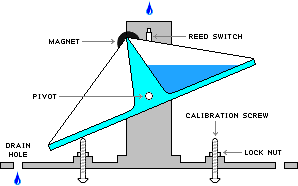Rainwater
National Hazard
   
Posts: 937
Registered: 22-12-2021
Member Is Offline
Mood: Break'n glass & kick'n a's
|
|
Reflux detector/ tipping bucket glassware
On the industrial distillation columns ive worked on they measure the reflux mass with a water wheel or tipping bucket located just below the
condencer.

image source
The appratus has a magnet and reed switch that indicates when fluid is condensing and flowing down
Is their a special appratus that performs this function for organic glassware?
How is this done by professionals? Do they just sit and watch?
Not only would a water wheel in 24/40 look incredibly cool spining as my distillation progresses, but with the distillation controller i been working
on, this would help it track flow rate and fraction start/stop points.
"You can't do that" - challenge accepted
|
|
|
Sulaiman
International Hazard
    
Posts: 3721
Registered: 8-2-2015
Location: 3rd rock from the sun
Member Is Offline
|
|
If you use a fractionating column head
of the type that uses electromagnetic coupling
to tip an internal glass 'bucket'
for control of the reflux ratio / take-off rate,
then you could calibrate pulses/litre or ml/pulse.
You need the 'tipping' type, not the 'tilting' type.
My brief search found none for sale.
For diy there is a drawing on page 100 of Vogel in SM library
that shows the type, but no details.
In practice we use batch distillations
and measure fractions by final volume or weight,
because diy continuous fractionation is not practical
(unless you have a real (commercial) need for continuous production)
[Edited on 11-6-2023 by Sulaiman]
CAUTION : Hobby Chemist, not Professional or even Amateur
|
|
|
Rainwater
National Hazard
   
Posts: 937
Registered: 22-12-2021
Member Is Offline
Mood: Break'n glass & kick'n a's
|
|
(image)
Topped with a reflux condencer and collection flask.
Adjusting the stopcock to alter takeoff has been very effective.
Measuring reflux by counting a number of drops and clicking a stopwatch, then diving the two which gives drops per second.
Repeating for the takeoff and dividing the two results gives the reflux ratio.
Very annoying process for a long distillation.
Im thinking the easiest method would be to use a photoactive diode and a light sources located at the drip tip of the condenser. By measuring transit
events as a drop passes through the aperture of the sensors, that should, at a minimum, give a drop count. But could possibly give much more
information. Heating of the diode will be an issue, up against the bottom of the condencer will be hot
My rig is setup closest to book page 98, figure 11,17,2. (PDF Page 121)
Just glancing over the experimental section, (chapter 2) distillation, crystallization, diy vacuum pumps, and manometer with calibrations.
What else is in here?
.........
.........
It ..... it has it all. everything, all of it.
I could spend a long time nose deep in this text
6th edition, 50 bucks. Ya. Be here in a week
Edit: sorry seen a squirrel
I have been trying to program a box to detect fractions during a distillation for a long time now.
The main method used is percision tempature control and monitoring.
I have taken this as far as im able with good results, but their not great results.
The heart of the mater is regardless of what tempature the device sees, statistical algorithm can only perdict the probility of reflux and not witness
it.
Using common 3% vinegar as the raw material for a performance reference, manually the best ive done is 90%. The blackbox can do only 35%.
Reviewing the notes I took and the decision i made during the distillation. Reflux monitoring is required if this box is gonna get better.
[Edited on 12-6-2023 by Rainwater]
"You can't do that" - challenge accepted
|
|
|
|